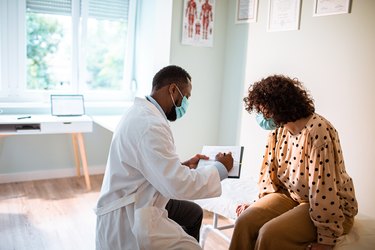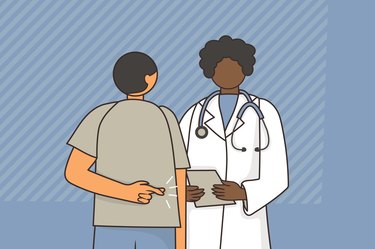
Doctor's appointments can be stressful. About two-thirds of Americans report that they feel overwhelmed, anxious or stressed before visiting their doctor, according to an October 2022 national survey conducted by market research company One Poll.
Even more worrisome, more than half say they're too afraid to ask their medical provider questions about their health condition. It's no wonder, then, that nearly half confess that they leave appointments confused.
Video of the Day
Video of the Day
One way to make doctor visits easier is to simply bring someone with you to your appointments, says Michael Hochman, MD, MPH, an internal medicine specialist in Los Angeles and host of the podcast The Healthy Skeptic.
"Going to the doctor is stressful enough and trying to remember everything they tell you when you're anxious is tricky," Dr. Hochman says. "You want someone else to be your extra set of eyes and ears, and to ask questions if things don't make sense."
The Benefits of Bringing Someone
There are a few reasons why you might want to bring someone to your doctor's appointment. They include:
Your Doctor May Listen Better
"Unfortunately, I hear about this all the time: a woman feels like her doctor is blowing her off, and then she brings in her husband or son, and lo and behold, her physician snaps to attention," says Caitlin Donovan, senior director of the National Patient Advocate Foundation in NYC.
If you bring someone else to your appointment, they can advocate for you, Donovan says.
You'll Have a Second Set of Ears
"I always joke that there are now twice as many people listening to what the doctor is saying," says Annette Ticoras, MD, BCPA, an internal medicine physician and owner of Guided Patient Services in Westerville, Ohio. "But the truth is most patients are nervous and anxious, while their companion isn't. That allows them to carefully listen and take notes, while you focus on what your doctor says."
Your Plus-One Can Review the Visit With You Afterward
Ninety percent of Americans have trouble remembering or understanding what to do after their doctor visit, according to the Cleveland Clinic. Only about half the information given to patients is remembered correctly, according to one older study published in April 2012 in the journal Medical Care.
"When it's your own health, and you've been given a diagnosis, particularly a serious one, then your brain just shuts down," Dr. Ticoras says. "We often don't hear anything after we hear those words that we fear, like heart attack or cancer. This way, the person who was with you can 'playback' the visit, so to speak, and help you remember what the doctor actually said."
4 Situations When It's Helpful to Bring Someone
If it's a routine appointment (like your annual physical), you don't have to bring someone, especially if you don't have any pressing health concerns, Dr. Hochman says. But there are certain situations where bringing someone is helpful, he says. This includes:
- You've just been diagnosed with a new condition. "Even if it doesn't seem that serious — for example, high blood pressure — it can be helpful to have someone there," Dr. Hochman says.
- You're about to start a new treatment. The person you bring may ask helpful questions, Dr. Ticoras says, and can take careful notes and go over details with you afterwards that you may have missed.
- You want them to take your symptoms seriously. "Sometimes a second person can really convey to a physician how a health condition is impacting a loved one's quality of life," Dr. Ticoras says. "They can say, 'her back is so painful she can't take two steps without crying,' or 'she's in so much pain that she can't walk her dog anymore,' and that's really helpful information for a doctor to know because they're not just hearing it from the patient. They are hearing it from an another, independent source."
- You're considering a major medical procedure. Your loved one can ask additional questions you may not have thought of, and take notes on what to expect — including your recovery.
Who to Ask
You may wonder who to ask — your mom? Your spouse? Your best friend? Your neighbor? There's no right or wrong answer, Dr. Ticoras says. Here, though, are some things to keep in mind:
- Look for someone who's comfortable and confident in a health care setting. "The best person to bring is someone who has a medical background — that might be a family member who is a nurse, or someone who themselves experienced a medical issue, who knows what it's like to navigate a health care setting," Dr. Ticoras says.
- Consider your relationship. Accompanying someone to a medical appointment can be an intimate moment. Bring someone who you have a relationship with, and feel comfortable with, Dr. Ticoras says.
- Keep the person's personality in mind. "It's good to bring someone who is very diplomatic but assertive," Donovan says. "It's a careful balance." If your significant other is known for being pushy with used car salesmen, for example, and uses some of those exact same tactics while sitting in the medical exam room with you, it may alienate the doctor, she notes. "But on the flip side, if they're very passive, you won't get the support you need," she says.
- Find a patient advocate. Another option is a private health care advocate, also called a patient advocate or navigator, Dr. Ticoras says. You can find names on websites like Alliance of Professional Health Advocates or the National Association of Healthcare Advocacy. Just keep in mind that there are no state licensing requirements or national accreditation standards for patient advocates. It's a good idea to ask for references, Dr. Ticoras recommends, or even see if friends or family have the name of an advocate you can use.
Tip
If you can’t find anyone to go with you, and you don’t want to hire someone, you can always ask your healthcare provider if you can record the meeting on your phone, Dr. Hochman says.
Most of the time a doctor will agree to it, especially if you explain you want to do this because you’re worried you won’t remember something. Many offices also now allow patients to access their electronic records online through apps such as MyChart, Dr. Ticoras points out. These often also include doctor notes of the visit, as well as visit summaries, which can help you if you are concerned that you’ll forget something.
How to Set Ground Rules
You might be bringing someone to your doctor visit, but you shouldn't expect them to run the show.
"It's your health, not theirs," Dr. Hochman says. "It's important to have a conversation beforehand, where you explain your health care goals, and what you expect to accomplish by bringing them with you."
It's always a good idea to provide your companion with details of your medical history, Dr. Hochman says. You may even want to give them access to your electronic health record so that they can look at past test results or doctor's visit notes. Then ask them to share any questions or concerns they have, so that you both can bring them up with your doctor.
Then make sure you set clear guidelines of what you expect them to do, Donovan says. Is it to take notes? Do you want them to chime in as you talk to your doctor? Or do you want them to be the "tough guy" in the room and be the one to ask for a second opinion? "You want to make sure that you're both on the same page when you walk into that appointment," Donovan says.
That may include asking them to leave the room whenever you deem it necessary — for example, you want to share some more personal information with your doctor, Dr. Ticoras says.
How to Support Someone at Their Doctor’s Appointment
If the shoe is on the other foot and you are the one accompanying a friend or loved one to their health care appointment, you may wonder what’s expected of you. The U.S. Department of Health and Human Services recommends the following.
Before the Visit
- Help your loved one make a list of questions to ask their medical provider
- Help your loved one make a list of health information such as changes to their health, like injury or illness, since their last visit, as well as a list of all the medicines and supplements they take
During the Visit
- Introduce yourself to the health care provider and explain why you’re there
- Take notes on your phone or on a notepad
- If you don’t understand something the doctor tells you, ask them to clarify it
After the Visit
- Discuss the visit with your loved one and make sure they understand what their medical provider said
- Ask if they need help getting prescription medications or arranging follow-up appointments. Remind them to do so if it’s necessary
- Cleveland Clinic: "Why We Forget What the Doctor Told Us: And What to Do About It."
- Medical Care: "What Did the Doctor Say? Health Literacy and Recall of Medical Instructions."
- US Department of Health and Human Services: "Support A Loved One At the Doctor: Quick Tips."
- One Poll: "7 in 10 concerned they won’t be able to understand the terminology their healthcare provider uses"
Is this an emergency? If you are experiencing serious medical symptoms, please see the National Library of Medicine’s list of signs you need emergency medical attention or call 911.


